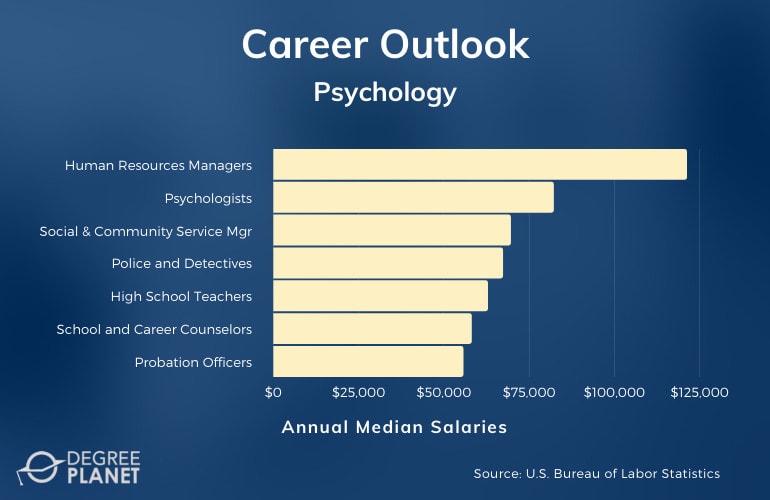In this article, we’ll help you explore some alternative graduate programs for psychology majors.

If you earned a bachelors degree in psychology, there can be many ways for you to apply your insights about the human mind, human behavior, and related social behaviors.
Editorial Listing ShortCode:
You might want to go on to get a graduate degree in psychology, but you might also want to consider how your bachelors in psychology might serve you in other complementary fields.
Alternative Graduate Programs for Psychology Majors

As a psychology major, you likely learned a lot about human relationships, human behaviors, and social and group dynamics too. A bachelors in psychology can also help you develop strong critical thinking and analysis skills.
You may be interested in earning a graduate degree in psychology, especially if your goal is to advance further with a doctoral degree in the field. Professionals with psychology doctorates tend to work in academia or pursue licensure to provide direct psychotherapy services.
Editorial Listing ShortCode:
That said, your psychology studies can also help you transition into any number of professional fields. Getting a masters degree in a complementary field may let you leverage your insights into human interactions, human relations, and human behaviors.
Some programs even let you earn a psychology masters degree combined with a doctorate, such as the dual masters and PsyD programs that a growing number of universities offer.
For this reason, you may want to consider pursuing graduate degrees in fields such as education, criminal justice, health sciences, or human resource management. An undergraduate degree in psychology can also act as a foundation for pursuing a graduate degree in social work or counseling.
Professionals with social work or counseling masters tend to qualify for psychology-related careers, such as school counselor, behavioral counselor, or marriage and family therapist.
5 Masters Degrees for Alternative Majors
Still having some trouble deciding if an alternative major is right for you? Here are some examples of popular graduate degree majors that can complement a bachelors in psychology:
You may want to explore your options to decide which program is right for you.
Masters in Criminal Justice

If you have an interest in the criminal justice system, you might want to consider a graduate degree in forensic psychology or criminal justice.
Graduate studies in criminal justice can give you a background in legal concepts and criminology. This might help prepare you for work in federal or local law enforcement agencies or in correctional and probation services.
Editorial Listing ShortCode:
You might also apply your combined learning in psychology and criminal justice to work in specialized legal or court-related roles. Some professionals even work in specialized areas of public policy and criminal justice reform.
Masters in Counseling

If you’re interested in providing direct emotional and developmental counseling services or vocational and career counseling services, a masters in counseling might be a more focused pathway.
While psychology degree programs can help you develop psychotherapy expertise, the topics in a psychology graduate program are not always directly related to counseling work.
Editorial Listing ShortCode:
For example, psychology training is also designed to help you understand a range of principals in experimental science, social psychology, and theoretical research. A masters in counseling might be an alternative major worth considering if you want to steer clear of studies emphasizing psychological research and experimentation.
A counseling masters may allow you to focus more on topics related to emotional development and patient psychology, subjects which are directly applicable to counseling roles.
Masters in Human Services

You might be interested in pursuing a masters in human services if you aspire to help others.
Some professionals in the field work with service organizations or government agencies that administer and design support services that help people get jobs, housing, or unemployment benefits. Others work for organizations that help people access vocational training or financial counseling.
Editorial Listing ShortCode:
As an undergraduate, you may have studied psychology for insights that would help you help others. A human services masters degree can help you apply your psychology expertise to social policy and social service institutions.
If you choose to study human services, you might want to consider focusing on study programs that emphasize administrative skills. Developing skills in administration can help you prepare for careers in health services management or related management and leadership roles in the human services sector.
Masters in Psychology

Graduate degrees in the field of psychology can be aligned with a range of distinct branches or concentrations. Different grad schools can also offer varying areas of specialization.
Common concentrations include clinical psychotherapy or general psychology research. You can also select from among many distinct specializations, including educational psychology, forensic psychology, industrial-organizational psychology, or psychiatry.
Editorial Listing ShortCode:
While these specializations are all related to the study of psychology, they can help prepare you for distinct career pathways and work settings.
Masters in Social Work

A bachelors degree in psychology can often provide a relatively smooth segue into a social work masters program. Both areas of study have components related to careers in counseling and psychotherapy.
For example, you might pursue counseling licensure in a psychology program, but an alternative could be to get a masters in social work with a concentration in clinical social work.
That said, social work degree programs can also offer career pathways for behavioral counseling related to community health risks. These health risks can include obesity, family and marriage counseling, or alcohol and substance abuse interventions.
Editorial Listing ShortCode:
With the right course concentration, you can also prepare for roles in social work administration or in the management and delivery of community-related social services.
If you want to work in counseling and therapy services or related support roles, a masters in social work might be a practical way forward. A social work masters program typically involves course designs with less emphasis on psychological theory and experimental science.
Alternative Careers for Psychology Majors

A number of psychology undergraduate students consider alternative majors when they plan for graduate school.
Some complementary career fields include teaching, educational leadership, school counseling, law, marketing, human resource management, social work, human services, and criminal justice.
According to the Bureau of Labor Statistics, there are many rewarding and well-paying careers related to psychology studies and complementary fields.
| Careers | Annual Median Salaries |
| Human Resources Managers | $121,220 |
| Psychologists | $82,180 |
| Social and Community Service Managers | $69,600 |
| Police and Detectives | $67,290 |
| High School Teachers | $62,870 |
| School and Career Counselors and Advisors | $58,120 |
| Probation Officers and Correctional Treatment Specialists | $55,690 |
| Social Workers | $51,760 |
| Marriage and Family Therapists | $51,340 |
| Substance Abuse, Behavioral Disorder, and Mental Health Counselors | $47,660 |
Sticking with grad schools for psychology is of course an option that can help prepare you for a range of career paths, depending on your interests and areas of specialization. Graduates with psychology doctorates may pursue careers in clinical psychotherapy services or train to provide educational psychology assessment and testing services.
Professionals with expertise in industrial-organizational psychology may also work in organizational design, human resource development, workforce development, or organizational leadership.
Grad School Admissions Requirements for Psych Majors

Admissions requirements vary by school and program, but common requirements are likely to include:
- GRE or GMAT scores (only some schools require them)
- Bachelor’s degree or equivalent
- Satisfactory GPA
- Letters of recommendation
- Specified prerequisite coursework or professional experience (when required)
Many graduate programs don’t require a bachelor’s in the same major, but they may require non-psychology majors to complete prerequisite courses or other specified admissions requirements.
What Are Careers Related to Psychology?

When it comes to psychology careers, it can be natural to think of jobs in clinical psychotherapy, counseling, or academia. But there are careers across different branches of psychology and in related fields that you can consider as well. Take educational psychology and forensic psychology, for example.
An educational psychologist typically works in school settings. They can help school leaders assess and support special needs students and help design specialized learning interventions. School psychologists may also administer specialized behavioral or academic testing.
Some professionals utilize their psychology training at schools and colleges in roles related to therapeutic counseling or academic, vocational, and career counseling.
Editorial Listing ShortCode:
Forensic psychologists’ work is closely associated with the field of criminal justice. They may use their expertise in criminal investigations, assessing criminal defendants for court proceedings or working in correctional settings.
In the business field, specific marketing or human resource management roles can be highly complementary with psychology expertise, especially with consumer psychology or industrial-organizational psychology.
Psychology degrees can be complementary to many career pathways. Your ability to qualify for specific careers and job roles can depend on a number of factors, such as your areas of concentration, your work experience, and any licenses or certifications that you hold.
What Can I Do with a Psychology Degree in the Medical Field?

Many psychologists who work in medical settings provide direct clinical psychotherapy services to patients, either in clinical settings, in institutional settings, or in private practice. Some professionals specialize and pursue licensing to work as qualified medical psychiatrists.
Psychiatrists often work in medical or clinical settings because they are trained to diagnose and treat severe mental illness or severe psychiatric disorders. Psychiatrists are also trained and licensed to prescribe psychotropic drugs and to monitor patients who take these medications.
Those who train in psychology might also qualify to work as psychiatric technicians or medical lab technicians.
What Masters Degree Can I Get with a Bachelors in Psychology?

Psychology training can complement many fields of study and career pathways. You might decide to go on to pursue a psychology masters, but you can also consider a range of non-psychology majors.
For example, if you have an interest in organizational leadership or human resource management, you might pursue a masters in industrial-organizational psychology or an MBA. Getting a masters in marketing or an MBA with a marketing concentration are other complementary master degree pathways to consider.
Some psychology majors decide to use their bachelors as a foundation for pursuing a professional law degree. If you want a career providing counseling services, you could study more psychology or pursue a masters in social work, counseling, or human services.
Another option could be to pursue a degree in healthcare management. A bachelors in psychology could be a stepping stone to a wide range of academic or professional masters degrees.
How Long Does It Take to Get a Master’s in Psychology or a Related Field?

Many master degree programs take about 2 years. Some may take longer, especially if you’re factoring in internship, field study, or thesis requirements. That said, if you study full-time and sign up for an accelerated study schedule, you might be able to finish in as little as 12 months to 18 months with year-round study.
A growing number of universities even offer accelerated psychology degrees online for students interested in this option.
Many factors can impact the time it takes to complete your masters degree, including course credit requirements, thesis requirements, or other capstone or clinical field study requirements.
Is Psychology a Good Career Choice?

Yes, psychology is a good career choice for many professionals. The field of psychology offers many diverse branches of specialization to choose from, specializations that can open doors to rather different career pathways.
What you learn about human motivations, thinking, and behavior in your bachelors in psychology program can be complementary to many other fields. Complementary sectors can include education, organizational leadership, law, counseling, and marketing.
Psychology itself is a field that offers many diverse pathways, but it’s also a major that complements many alternative graduate degree options.
Getting Your Masters Degree Online

There’s quite an assortment of alternative graduate programs for psychology majors. There are also psychology-related careers in a wide range of industries.
It may be time to follow up on your personal career goals and interests by exploring the many online masters programs and their accompanying specializations. Online programs can come in many different shapes and sizes, including ones with accelerated study options, part-time learning formats, and varying course designs.
You can start researching accredited masters programs today to determine which learning designs and specializations are right for you.

